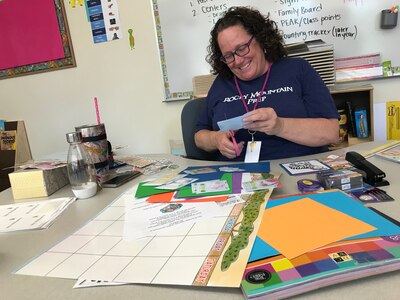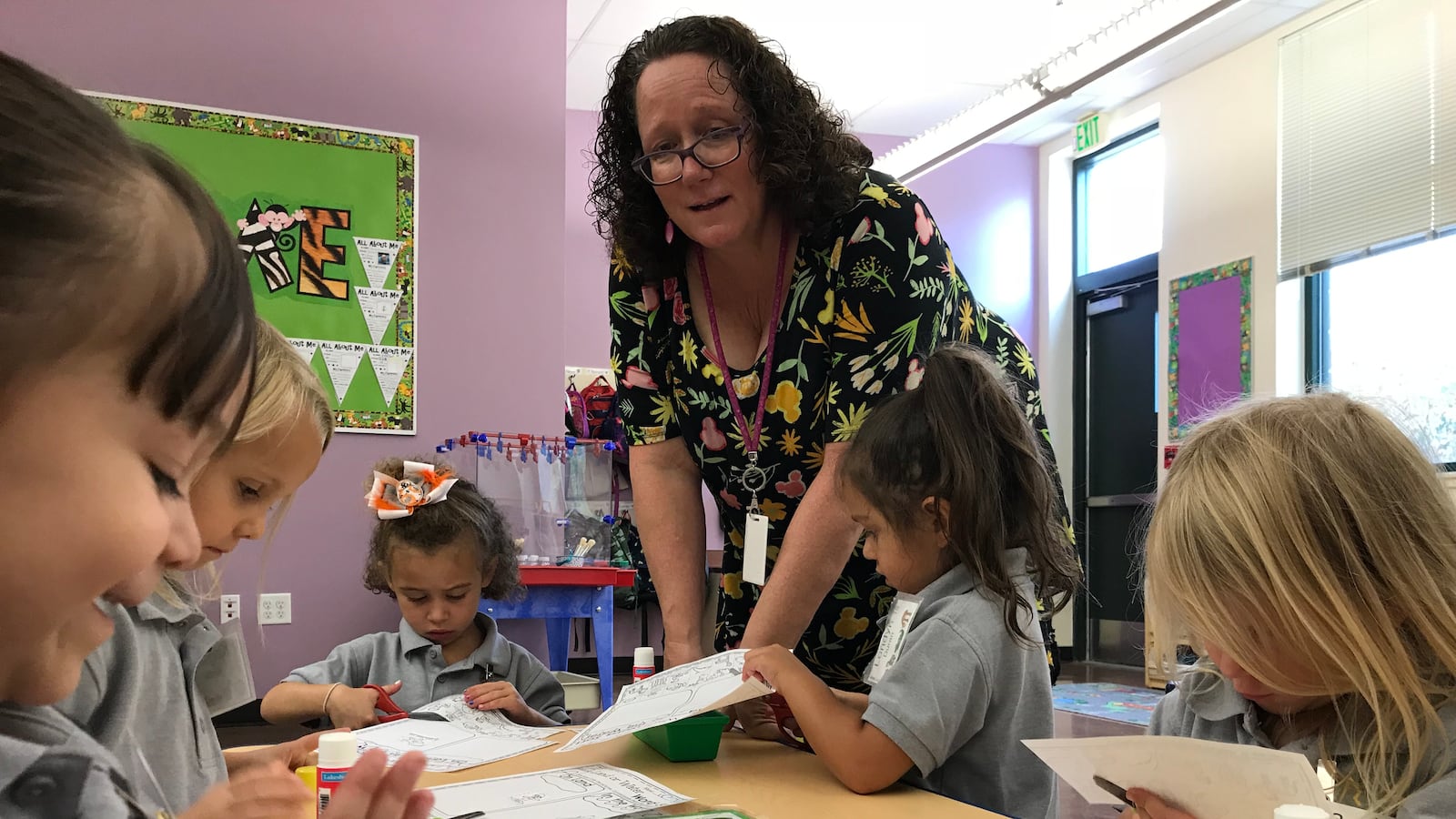Her preschoolers had just finished breakfast, and teacher Mary Ann Mahoney was stooped over a low sink, scooping soggy cereal out of the drain with her bare hand. Even as she plopped the sweet-smelling mush into a nearby trash can, the former school principal smiled and remarked how much she loves being back in a classroom — wet cereal and all.
“This is just such a fun and glorious age,” Mahoney said. Four-year-olds, she said, are “little sponges” with a zest for learning and life. Those are traits shared by Mahoney, who favors Mickey Mouse leggings and jokes that she’s liable to break into song at any moment.
“We have a good time every day,” she said.
What’s unusual about Mahoney’s return to teaching is that she spent the past couple of years as principal of a northwest Denver charter school that the district threatened to close for its chronically low test scores. The school, Cesar Chavez Academy, occupied the same building where Mahoney now spends her days teaching preschool.
Instead of fighting the district to stay open, the leaders of Cesar Chavez Academy decided to do the opposite. They dissolved the stand-alone charter at the end of last school year and sold its coveted building in the Berkeley neighborhood to Rocky Mountain Prep, a homegrown charter network with three other schools that serve the same demographic — predominantly low-income and Latino — and get impressive academic results.
This kind of deal between charters is rare in Denver. In this instance, it allowed Cesar Chavez to spare students and families the trauma of a drawn-out last stand or a hard closure, where the school would be here one day and gone the next with nothing to replace it.
At least one previous example of a struggling stand-alone charter handing off management to an academically successful network has shown positive results. The networks get something out of it, too: Many are eager to expand, and these takeover deals could be a more viable way to do that in a district where enrollment is flat and school buildings are scarce.
In fact, Rocky Mountain Prep is now in talks with another stand-alone charter, Roots Elementary in northeast Denver, to do the same thing. It’s worth noting, however, that not everyone thinks charter network expansion is a good thing. While district officials have embraced it as a way to improve schools, many parents and community members view charters, which are publicly funded but independently run, as unwanted competition.
Cesar Chavez and Rocky Mountain Prep worked together to try to make their transition smooth. For instance, Cesar Chavez allowed Rocky Mountain Prep to set up a mock classroom last year in the network’s style, with daily learning goals and charts posted on the walls tracking fictitious students’ reading and math progress. That allowed real students who were curious about the network to stop by and ask questions. About 50 percent of Cesar Chavez students stayed and enrolled at Rocky Mountain Prep this year, according to school officials.
The mock classroom, and several other steps the two schools took, made all the difference, said Sara Carlson, the principal at what is now called Rocky Mountain Prep Berkeley.
“From the very first time I met with the (Cesar Chavez) team, in the spring of 2017, the way Mary Ann introduced me was, ‘I reached out to Sara, and I’m excited about what Sara and Rocky Mountain Prep do,’” Carlson said. “That changed the narrative.”

In taking over Cesar Chavez, Rocky Mountain Prep drew on lessons it learned from another transition that did not go as smoothly. In 2016, the school board in the neighboring city of Aurora voted to phase out a struggling elementary near the Denver border called Fletcher Community School and replace it, one grade at a time, with Rocky Mountain Prep.
The decision faced fierce pushback from Fletcher teachers. Carlson, who was involved in the takeover, said it also felt “cut and dried” for some families: One day the school was Fletcher and the next it was a charter with new colors, new uniforms, and new teachers.
Even though Rocky Mountain Prep guaranteed an interview to any Fletcher teacher who wanted to work for the network, none applied, Carlson said. When the network extended the same guarantee to the teachers at Cesar Chavez last year, nine took up the offer, she said. Five of them were hired, as was the former Cesar Chavez operations manager.
Arguably the most important steps the network took, though, had to do with students and families. Even before Cesar Chavez announced the transition, Carlson said she met with a group of fifth-graders to ask them what Cesar Chavez could have done better and what they would keep the same. They made it clear that close relationships were important, she said.
“They said, ‘The teachers really love us,’” Carlson said. It was notable how many of them said the staff knew not only their parents, but their cousins and extended family, too, she said.
That conversation made Carlson realize it would be key for her to get to know the community before Rocky Mountain Prep took over. Starting last October, she made a point to be at the school at least once a week, doing lunch duty or helping at dropoff and pickup.
“Mary Ann would introduce me to families who were important stakeholders,” Carlson said. “So when I started sending out invites to coffee hours and tours, there was a face to the name.”
Six weeks into the school year, parents said the transition has gone well, for the most part. There have been some complaints about the new bell schedule, which requires families to drop off and pick up later than before. One mother said she’s frustrated that she now can’t use a parking lot that Rocky Mountain Prep has reserved for staff.
And while the school uniforms have not changed much — blue polo shirts, black shoes — some students have grumbled that they’re no longer allowed to wear jeans on Fridays.
But parents seem pleased with the academics, which mother Tiesha Vigil called “challenging.” Vigil said her kindergartener and second-grader are making progress on their reading, and she’s seen huge changes in her preschool daughter, who has special needs. Before her daughter started school, she struggled with speech, and it was difficult for even her family to understand her, Vigil said. Now, a month and a half later, she’s speaking in full sentences.
“I can see how good it can be already,” Vigil said.
The promise of more rigor and structure is partly what prompted Vigil and her husband to keep their elementary-aged children at Rocky Mountain Prep after Cesar Chavez closed. (Her oldest son had to find a new middle school because unlike Cesar Chavez, which was a K-8, Rocky Mountain Prep only serves students in preschool through fifth grade.)
The promise of trusted and familiar faces — including Mahoney and her former assistant principal, who is now teaching second grade there — was a factor, as well. Parent Benedicta Pacheco, whose three older children attended Cesar Chavez, said knowing her youngest child could have Mahoney as a preschool teacher made her feel comfortable staying.
“She knows us,” Pacheco said. “My kids feel like family.”
The desire to provide continuity played into Mahoney’s decision to stay, too, she said. She’s invested in the success of the takeover, especially since the idea came from her and other Cesar Chavez leaders. She said the first time she visited Rocky Mountain Prep, she thought, “This school is doing what we’re trying to do, but they’re doing it more effectively.”
As a Rocky Mountain Prep teacher, Mahoney said she has come to see why. The network is relentless in training its staff; Mahoney had just two weeks off last summer from the time Cesar Chavez closed until training began at Rocky Mountain Prep. Administrators routinely pop into classrooms, and if they notice several teachers struggling with the same thing, such as giving precise directions, they’ll have everyone practice it in the morning before school, she said.
“I was like, ‘Oh, this is really brilliant. We should have been doing it,’” Mahoney said.
Mahoney said she has also come to see the value of the strict, step-by-step routines Rocky Mountain Prep has the students follow. The routines dictate everything from how to walk in the hallways, to how to sit on the carpet and how students get up from their desk chairs.
Such routines are controversial; critics view them as controlling and oppressive, especially since they are most often used in schools that serve a majority of students of color from low-income families. Mahoney herself was wary, but she said she’s found that the routines cut down on the time it takes to transition from one activity to another, leaving more time for learning.
And some of the ways Rocky Mountain Prep conducts that learning are different than what Mahoney had seen in her 30 years as an educator. She said she was blown away last year when, on a visit to a different Rocky Mountain Prep campus, she watched second-graders debate with each other the best way to calculate the perimeter of an imaginary fence.
“The teacher never said, ‘You’re wrong.’ The teacher said, ‘I see you disagree,’” Mahoney said. Just observing that one lesson, she said, “will change my teaching practice forever.”
“I know I will exit this year a better teacher than [when] I started,” Mahoney said.

As happy as families are that Mahoney is back, she is even more thrilled to be in a classroom again. In a way, teaching preschool is coming full circle for her; it’s where she started her education career. “My favorite ages in life are 2- to 5-year-olds,” Mahoney said. “I just think they’re funny, and they say exactly what they want.”
That trait was on full display on a recent morning in Mahoney’s class. As her 4-year-olds choppily maneuvered blunt-tipped scissors to cut out pictures of animals and paste them in the correct habitat — land or water — Mahoney multitasked, helping the students write their names in crayon at the top of their papers, checking to see if they washed their hands after going to the bathroom, and complimenting them when they shared the glue.
At one point, she called a little boy by the wrong name.
“I’m sorry, Nathan,” she said. “I lost my brain. I lost my brain!”
Another boy looked at her seriously.
“I think it went to Las Vegas,” he said.
Mahoney threw back her head of curls and laughed.
Correction: Due to a source error, the original version of this story reported that a higher percentage of Cesar Chavez Academy students enrolled at Rocky Mountain Prep Berkeley.

